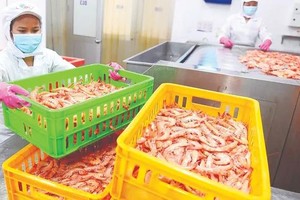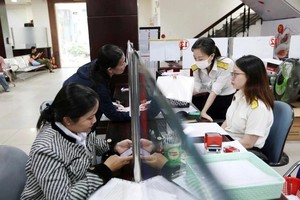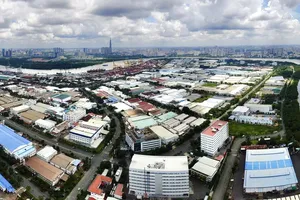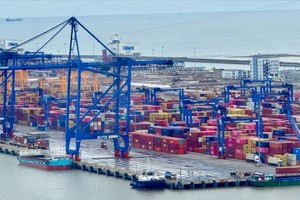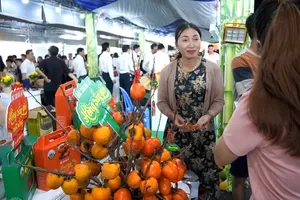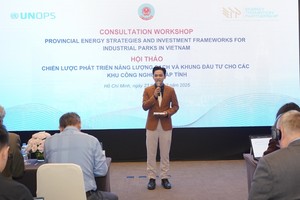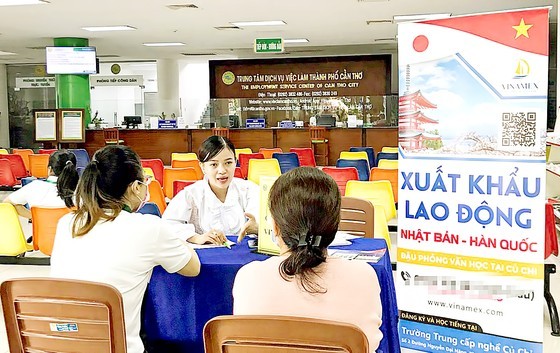 |
Consulting laborers wishing to work abroad at the Employment Service Center of Can Tho City |
Since the beginning of this year, the Center of Overseas Labor (COLAB) has continuously posted announcements on Vietnamese workers sent to RoK under the Employment Permit System (EPS) program.
Meanwhile, until May 31, COLAB is recruiting 80 midwifery interns to Japan. These interns will practise in Japanese clinics at a monthly salary of VND35 million (US$1,480) exclusive of allowances, along with free Japanese language training, medical examination, visa application fee, and air fare.
Many private training companies for labors working abroad have informed that they are receiving large orders from familiar markets, especially Japan, which is increasing its manufacturing and trading activities to compensate for its economic loss in the Covid-19 pandemic.
Deputy Director Nguyen Gia Liem of the Department of Overseas Labor (DOLAB) said that the labor export market of Vietnam is expanding to European countries, Singapore, and Australia, Israel in the future. He estimated that it is possible to send about 110,000 workers out this year. This January alone, 21,000 people successfully obtained their jobs in companies in other nations.
The quality of Vietnamese labors should be enhanced via close collaboration between vocational schools and labor export enterprises in order to meet the demands in the recruitment process of international companies.
Deputy Minister of Labor, War Invalids and Social Affairs Nguyen Ba Hoan stressed that to fulfill the goal of 2023, it is necessary to maintain a stable supply for existing markets while seeking new potential ones.
Addressing limits in policies and administrative procedures, accelerating online public services, promoting the export of high-quality, skillful workers are also essential because this is the popular trend in the next few years. Right now, 90 percent of Vietnamese labors working abroad are still unskillful ones.
Deputy General Director Nguyen Xuan Lanh of Esuhai Co. Ltd., specializing in training labors for the Japanese market, said that his enterprise is cooperating with universities and colleges to upgrade the level of workers in order to send 2,500 engineers and interns to companies in Japan. Deputy General Director Nguyen The Dai of East Sea Trading Service and Labor Export JSC. (Estrala) also informed that he is collaborating with universities and colleges in HCMC, Ben Tre Province, Binh Dinh Province to train high-quality laborers to satisfy the requirements of his clients.
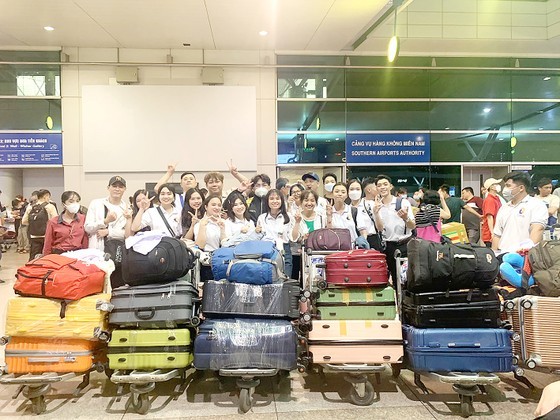 |
Vietnamese laborers going to work in Japan. (Photo: SGGP) |
The markets that need high-quality workers in 2023 are Australia, New Zealand, and Canada, all of which are rushing to recover their national economy after the Covid-19 pandemic. Particularly, since this year, Vietnam can send its labors to Australia to work in the agricultural field at a monthly salary of VND80 million ($3,390). Canada is in need of 465,000 immigrants to work, and this number will increase to 500,000 in 2025.
In the last 10 years, there have been over 1 million Vietnamese laborers and specialists going abroad to work, a rise of 40 percent compared to the average of the previous period. Their yearly income is at VND200 million ($8,484), much higher than that of the same position in the country. They are able to send $10 billion back home.
Head of EPS Office in RoK Pham Minh Duc commented that in 2023, this country needs 110,000 foreign laborers to work in the fields of industry, agriculture, and fishery. To attract more people, RoK has just announced an improvement in permitting employees from the EPS program that Vietnam is taking part in. Accordingly, more accommodation support will be given to foreign workers, and requirements for people to obtain a job in the shipbuilding industry are loosened. Therefore, this year, Vietnam plans to send 10,000 people there.
Head of the Social Life Research Institute Nguyen Duc Loc stated that the level of export labors from Vietnam for the past few years is rather low, and most are unskillful. Hence, there should be a long-term strategy to train more high-quality, skillful workers in order to increase their income, and in turn the value they can bring back to their homeland. These people themselves when coming back home will be able to better contribute to their local place thanks to all expertise and experience accumulating while working abroad.
Vice Chairman of HCMC Vocational Education Association Tran Anh Tuan stated that the link between labor export enterprises and universities, colleges, vocational schools must be strengthened to release capable human resources. Meanwhile, people wishing to work overseas must equip themselves with language proficiency, enhance their sense of discipline, improve their soft skills. More importantly, in the limited time working abroad, besides trying to earn much money, these people should try to hone their professional skills so as to contribute to their fatherland later when being back home.
Deputy Head of DOLAB Nguyen Gia Liem informed that all necessary fees for the labor export process is stipulated in the law. All labor export enterprises must report these amounts to DOLAB and clearly specified them in the contract with corresponding workers. DOLAB will use these reports to carry out sudden examinations at these businesses and strictly punish law violations.

